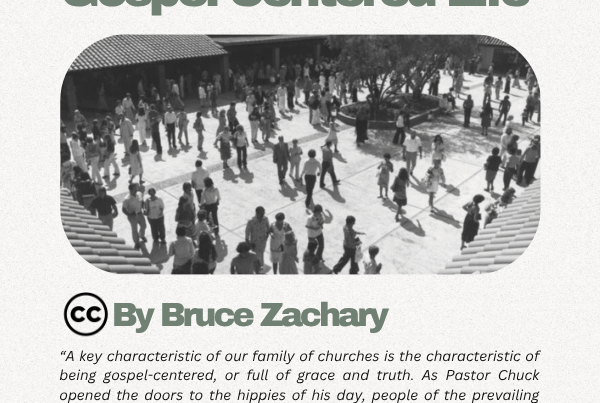
We’ve already looked at two ways that we can easily make people into projects, and today we tackle the third and final way. We make people into projects when discipling them becomes a task to be completed instead of a relationship to be nourished.
Too Close for Comfort
This one hits uncomfortably close to home for me. As a task-oriented person, I naturally tend to put the thing to be done above everything or everyone else. For me, success is accomplishing what I set out to do: finishing the job. This means that I’m usually focused, determined, and committed, which are great things.
I love a challenge, and difficult doesn’t intimidate me, but hidden among these strengths is a huge weakness that I must be aware of and counterbalance. Because of my strong drive to put my full attention on completing the task, I try to do the same thing in my relationships. I make friendship an assignment and push discipleship into a line on my “to do” list. When I do this, I miss the entire point of what discipleship is, and I don’t think I’m the only one missing the mark.
More Than a Program
I fear that we’ve sucked all the life out of making disciples by modeling it as a curriculum to be followed. It’s become little more than another meeting on our weekly calendar. A timeframe of several months or a year is set in which “discipling” someone is to be achieved and a specific goal met, e.g., to read a book together or to complete a bible study. Neither books nor studies are intrinsically harmful, but we must be aware of the tendency these organizational tools have of taking over.
A tool is meant to be used to aid in the process of something. It’s not an end in and of itself. Instead of a tool to guide us and our conversations, these things can quickly morph into a task to be completed. Finishing the book or the study becomes the benchmark of success.
What happens when this switch is made is that the relationship between the disciple maker and the disciple becomes secondary, or even worse, a mere imitation of a relationship instead of a genuine one. The real objective when this happens is to complete something, instead of walking alongside someone in relationship.
This becomes painfully clear after the “discipleship” program is completed. Are the two parties involved friends by the end? Not best friends, but do they have some kind of relationship with each other that doesn’t focus on the subject they studied together? Do they know about the victories and challenges in each other’s lives (not all of them, but at least some)?
While it’s unrealistic to assume that friendship will always be the natural result of discipleship, I do think it should be the norm. Time spent reading a book or studying scripture should open the door to real conversations that connect real life to real truth and nourish real friendship.
Lessons Learned
I’m passionate about this because I’ve been both the disciple and discipled others, within the context of a genuine friendship and also outside of it. I’ve seen and experienced the difference. One mentor of mine (can I use that as a substitute word for disciple maker?) was very faithful to meet with me and read through a book with me. We met at a restaurant, ate food, and talked about the book.
It was fine, but we didn’t have an authentic friendship. In fact, we had no contact outside of our meetings. Even though we went to the same small church and her son was a friend of mine, if the book wasn’t in my hand, we didn’t talk. She wasn’t involved in my life in any capacity nor was I in hers. I didn’t learn anything from her life because I had no access to it.
She was an active member of our church and a mature believer, so don’t get the idea that she didn’t love Jesus because she did. She was just following the pattern of discipleship that she’d been taught. She was prepared for our meetings and faithfully read the book with me, but after we completed the book, we stopped talking all together.
I don’t know if she felt the same way, but I remember feeling like reading that book and meeting with her were things I was supposed to do as a good Christian. For me, they were boxes to check, and once I did that, I was free to move on to the next thing.
There was another mentor however that left me with a completely difference experience. First of all, she invited me over to her house. I met her dog. I spent time with her and her husband. I wasn’t there every week or every month; it was only a couple of times. But it was enough to help fold laundry and eat snacks from her cupboard.
When she had their first baby, I babysat for her. Just once, but still our lives were connected outside of the confines of our “discipleship” in a very natural way. Shortly after having her baby, she moved away and we lost contact for many years. But this past year we exchanged a few emails and the depth found in them attests to the authenticity of our friendship all those years before.
Even though she’s older than me, she was always honest about how she was doing. She didn’t share every detail about the things she was going through, nor should she have, but I felt like we were real friends. I still do, and if I needed advice and the two of them were my only choices of people to call, I’d call the second lady, my friend.
The funny thing is, I don’t think she was any more spiritual than my first mentor, nor that she loved Jesus more. She just treated me more like a person to know instead of part of a program to be completed. Notice that, at least for a season, my interactions with both ladies ceased.
Sometimes there’s a beginning and an end in the process of discipling, so I’m not suggesting that time frames aren’t helpful or that discipleship is never-ending. But I challenge you not to make the end coincide with the last page of a book. Allow the Lord to move you or the other person on in his timing and in his way and allow him to define what discipleship looks like in between.
The Heart of It All
As I read about the life of Jesus in the gospels, I can’t find one single interaction that would lead me to believe that his disciples ever felt like they were a box for Jesus to check off of his ministry to-do list. From what I see, they had a very typical rabbi/disciple relationship: Jesus didn’t hide when exhausted, even sleeping in their presence.
They knew when he was hungry. They saw his dependence on the Father when he took time away from his hectic schedule to pray. He shared meals. They discussed an endless variety of topics, and they felt free to ask him questions about his teachings and about spirituality in general.
One thing that I personally find extremely difficult to imitate is the amount of time Jesus gave to his disciples. He was available to them daily for a period of three years, pouring endless time and energy into them. I find this impossible and long for clarity in this area.
What does it mean to disciple someone in my context? This is a question I’m currently wrestling with. So I don’t consider myself an expert disciple maker, nor have I found THE way to do it. Maybe more than one way exists.
One thing I’m sure of though: each time we’re honored with the opportunity to disciple someone, we should fall on our faces before our Father and ask for wisdom in humility realizing that we’re not Jesus.
While he did leave us an example perfect in every way, we may not be able to replicate his specific methods of discipleship, like spending every day with the disciples. But we can imitate his heart. His heart was first and foremost burning to do the will of the Father. He sought this will and then set his face like flint to follow it. He yielded every desire and life-choice to the loving guidance of his Father and as he moved along in this journey, invited others to join him.
He modeled and taught them how to completely and utterly trust in the love and faithfulness of God and his life testified to the joy and the power that trust brings. Trust to the death. Trust beyond death, to resurrection.
This is what discipleship should be. A heart struggling to trust on display. A life willing for the layers to be peeled back by another to reveal the inner workings of a prayer life filled with praises and laments, trust and honest questions. It should be a sharing in the sacred fellowship of his sufferings as well as the power of his resurrection.
If you can do that by reading a book, then read it, but don’t limit a potential friendship to the questions at the end of each chapter. Don’t believe the lie that discipling is something to be done.
Follow Jesus with all your heart, soul, strength, and mind, and when you notice someone trying to do the same, invite them in: into your heart and into your relationship with Jesus.










